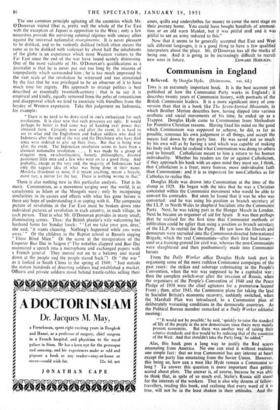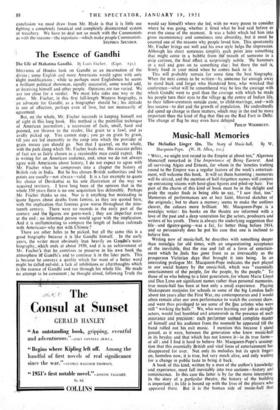Communism in England
1 Believed. By Douglas Hyde. (Heinemann. cos. 6d.)
Tuts is an extremely important book. It is the best account yet published of how the Communist Party works in England • it describes twenty years of Communist history, with portraits of British Communist leaders. It is a more significant story of con- version than that in a book like The Seven-Storied Mountain, in which Brother Merton describes how, having dipped into various aesthetic and social movements of his time, he ended up as a Trappist. Douglas Hyde came to Communism from Methodism for Primitive Christian reasons. Having fixed his mind on the good which Communism was supposed to achieve, he did, as far as possible, renounce his own, judgement in all things, and accept the means laid down by the party line. He was saved not so much by his own will as by having a soul which was capable of making his body sick when he realised what Communism was doing to others and to himself. Catholicism meant to him a return to his human individuality. Whether his readers are for or against Catholicism, if they approach his book with an open mind they must see, I think, that Catholicism is a freer, more human, more individualist faith than Communism: and it is as important for non-Catholics as for Catholics to realise this.
Douglas Hyde was drawn into Communism at the time of the slump in 1929. He began with the idea that he was a Christian concealed within the Communist movement who would be able to convert his comrades. But soon he found that it was he who was converted: and he was using his position as branch secretary of the 1.L.P. in North Wales to shepherd Socialists into the Communist Party. Next, he was taking part in the Hunger March in London. Next he became an organiser of aid for Spain. It was then perhaps that he realised for the first time that Communist methods of infiltration could be uglier than using a position as branch secretary of the I.L.P. to recruit for the Party. He saw how the liberals and democrats were recruited into the Communist-directed International Brigade, which the real Communists—after their first bad losses— used as a training-ground for civil war, whereas the non-Communists were slaughtered and then posthumously made into Communist heroes.
From the Daily Worker office Douglas Hyde took part in organising some of the most ruthless Communist campaigns of the past years: the strikes and sabotage culminating in the People's Convention, when the war was supposed to be a capitalist war ; then the complete switch-over after the invasion of Russia, when the organisers of the People's Contention of 1940 and the Peace Pledge of 1950 were the chief agitators for a premature Second Front ; then, after 1945, the Communist plans for taking the lead in Socialist Britain's economic recovery, suddenly switched, when the Marshall Plan was introduced, to a Communist plan of deliberately worsening conditions in the democratic countries. As the Political Bureau member remarked at a Daily Worker editorial meeting: " • It would not be possible,' he said, 'quickly to raise the standard of life of the people in the new democracies since theirs were mainly peasant economies, But there was another way of raising their relative standards and that would be by reducing that of the countries of the West. And that shouldn't take the Party long.' he added."
Alas, this book goes a long way to justify the Red scares emanating from America. No one can read it without realising one simple fact: that no true Communist has any interest at heart except the party line emanating from the Soviet Union. However, this being so, how can a man like Hyde remain a Communist so long ? To answer this question is more important than getting scared about plots. The answer is, of course, because he was able to think that, in spite of so much evil, Stalin's Russia still stood for the interests of the workers. That is also why dozens of fellow- travellers, reading this book, and realising that every word of it is true, will not be in the least shaken in their attitudes. And the
conclusion we_ must draw from Mr. Hyde is that it is little use fighting a completely fanatical and completely disinterested system of treachery. We have to deal not so much with the Communists as with the reasons—the injustices—which make people Communists.
STEPHEN SPENDER.



































 Previous page
Previous page